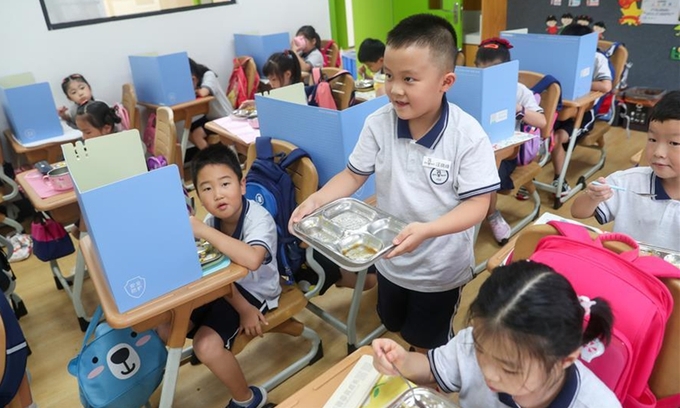December 5, 2025 | 06:25 GMT +7
December 5, 2025 | 06:25 GMT +7
Hotline: 0913.378.918
December 5, 2025 | 06:25 GMT +7
Hotline: 0913.378.918

A student is on the way to return his empty plate at a primary school in Changning District of Shanghai, east China, Sept. 2, 2020. The school promotes the "Clear Your Plate" campaign to stem food waste as new semester begins. Photo: Xinhua.
The statistical system, standards and indication system of food loss and waste will be improved, according to the plan, which was unveiled by the general offices of the Communist Party of China Central Committee and the State Council, Xinhua News Agency reported on Monday.
The loss rates of grain and food during their production, storage, transportation and processing will be below the average international levels by the end of 2027.
Meanwhile, per capita food waste per meal in the catering industry, government canteens, school canteens and enterprise canteens will decrease significantly, and food waste will be effectively curbed.
The plan lists key tasks to reduce food loss and waste, including enhancing national awareness of saving food, anti-waste actions in the catering industry as well as in government canteens, and strengthening food loss and waste statistics. The action plan, with seven major clauses, has been designed to facilitate the implementation of China's food security law and China's anti-food waste law.
As part of its call for anti-waste action in the catering industry, this action plan mentioned that consumers should be encouraged to purchase smaller meals by setting up eco-friendly virtual accounts, awarding bonus for conservation and distributing preferential coupons.
It also calls for promoting the change of customs and advocating civilized and frugal weddings and funerals are reiterated in the plan to raise food conservation awareness.
Food producers, operators and retailers are encouraged to provide assistance by donating food that meets safety and quality requirements directly to welfare and relief organizations in their localities on a regular basis, according to the action plan.
It also suggests that anti-waste actions should be carried out in the canteens of government agencies, schools and enterprises, urging the relevant departments to strictly regulate the meals for official activities, rationalize the number of meals reasonably so as to resolutely oppose food waste.
In 2022, a total of 1.05 billion tons of food waste was generated by the whole world, equivalent to 132 kilograms per capita, or nearly one-fifth of all food available to consumers, according to Food Waste Index Report 2024 released by the United Nations Environment Programme (UNEP).
Of the total amount of food wasted in 2022, 60 percent happened at the household level, with the food service sector accounting for 28 percent and the retail sector for 12 percent, the report added.
The total amount of wasted food in 2022, including grains, vegetables, fruits, meat, eggs and poultry, amounted to 460 million tons, causing an economic loss of 1.88 trillion yuan ($259,534 million), which is equivalent to 22.3 percent of the total value of agricultural output, according to a report released by the Chinese Academy of Agricultural Sciences in December 2023.
Global Times
/2025/12/02/2629-3-141849_60.jpg)
(VAN) Based on its large-scale planted forests, several rubber enterprises have proactively conducted greenhouse gas emission inventories in preparation for entering the forest carbon credit market.

(VAN) MAE is leading in developing a national rare earth strategy, which will be submitted to the competent authorities for promulgation in early 2026.
/2025/12/02/4006-4-092040_652.jpg)
(VAN) The model of converting low-efficiency rice land to aquaculture in many localities has helped increase incomes by 5 to 15 times, improve the environment, and form new fisheries economic zones.

(VAN) Funded by ACIAR, Project FST/2020/123 focuses on measures to prevent harmful alien species, thereby protecting forests from invasive threats.

(VAN) The National Assembly's Supervisory Delegation pointed out solutions for the blue economy, circular economy, environmental protection, and technology application for sustainable marine governance.

(VAN) Lao Cai’s forestry sector is stepping into the spotlight with a series of pioneering initiatives in forest management, monitoring, and sustainable development aimed at generating carbon credits.

(VAN) The Provincial Competitiveness and Governance Index (PCGI) is a tool designed to reflect the quality of local governance.